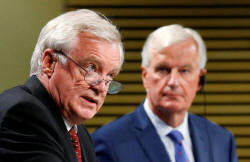|
German industry group
preparing for hard Brexit
 Send a link to a friend
Send a link to a friend
 [September 06, 2017]
By John O'Donnell [September 06, 2017]
By John O'Donnell
FRANKFURT (Reuters) - Germany's biggest
industry group has set up a task force including companies such as
Airbus, Siemens and Deutsche Bank to prepare for a disruptive British
departure from the European Union, according to people involved.
The Federation of German Industries (BDI) task force will identify by
the end of December the risks to German industry from a "hard" Brexit
after monthly meetings of dozens of experts, the people said.
The preparations are the result of growing nervousness amid slow and
acrimonious negotiations between Britain's Brexit minister David Davis
and his opposite number at the European Commission, Michel Barnier.
In Germany, companies are now preparing for the worst, including the
imposition of tolls and the risk of a loss of access to London financial
markets, the people involved said.
"Many people in Britain have hoped that they would get a special deal
from Germany. We've been saying for a year that this is not going to
happen," said Markus Becker-Melching of the Association of German Banks,
which is involved in the task force.
"We are working on the basis that there will be a hard Brexit," he said.
"The wheels are now set in motion to prepare for this."

One person directly involved with the task force, who asked not to be
named, added: "We have to plan now for there being no agreement, for
things not working."
The existence of the task force, which was established in June and is
now accelerating its work in regular meetings in Berlin, will be
officially announced in early October.
Its conclusions in December will be important in shaping the position of
the new German government, which may be in place then following
elections later this month.
The companies involved declined to elaborate on the work of the task
force.
DERIVATIVES WORRIES
More than six months into Brexit divorce talks that must conclude by
April 2019, there is little sign of progress.
[to top of second column] |

Britain's Secretary of
State for Exiting the European Union David Davis and European
Union's chief Brexit negotiator Michel Barnier hold a joint news
conference marking the end of the third formal negotiation session
in Brussels, Belgium August 31, 2017. REUTERS/Francois Lenoir/File
Photo

Earlier this week, Britain's David Davis warned a row over how much money
Britain should pay the EU when it leaves would probably last the duration of the
negotiations.
The EU has said this and other issues must first be resolved before talks on
future trading relations can begin.
Frustration has meanwhile been building in Germany, Europe's industrial
heartland and the EU's biggest economy.
Late last month BDI president Dieter Kempf criticized the British government for
its conduct in negotiations.
"The British government continues to lack a clear course," he said. "Despite
declarations of unity from British cabinet members, there is no coordinated
government approach."
The BDI, with 36 member associations representing 100,000 businesses, is one of
Germany's most influential lobby groups.
One of the problems at the top of its list, alongside possible tariffs, is the
potential disruption to multitrillion-dollar derivative markets.
These are based chiefly in London and are an essential means for German
companies to hedge against risks such as rising oil prices.
"While a straight-forward company loan would not really be touched, the
derivatives market poses a big potential problem," said the person directly
involved with the task force.

"No one should work on the assumption that there will be rules in place in time
to deal with this."
(Reporting by John O'Donnell; Editing by Mark Potter)
[© 2017 Thomson Reuters. All rights
reserved.] Copyright 2017 Reuters. All rights reserved. This material may not be published,
broadcast, rewritten or redistributed. |